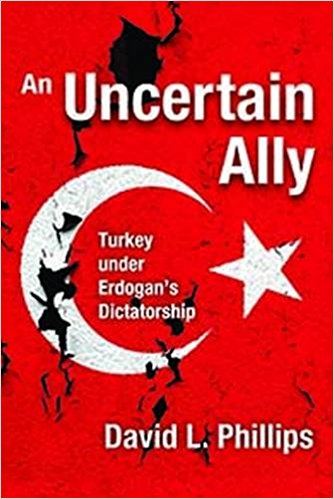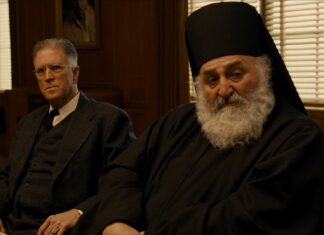As the publisher’s website for An Uncertain Ally proclaims, the book is an outright indictment of Recep Tayyip Erdogan, current president of the Republic of Turkey, who is referred to as a dictator. It is not a scholarly study, but rather a political history concluding with policy recommendations for the United States.
Phillips has written similar types of works before. In From Bullets to Ballots: Violent Muslim Movements in Transition (2009), he provides recommendations concerning how to moderate violent Muslim movements. With Losing Iraq: Inside the Postwar Reconstruction Fiasco (2011), he attempts to draw lessons from the mistakes made by the US in Iraq, while in Liberating Kosovo: Coercive Diplomacy and U. S. Intervention (2012), he examines the violent collapse of Yugoslavia and the US and NATO role in the creation of an independent Kosovo. Most recently, in The Kurdish Spring: A New Map of the Middle East (2015), he examines Kurdish movements in Iraq, Turkey, Syria and Iran, and a possible path towards Iraqi Kurdish independence.
His articles are frequently published in major American newspapers like the New York Times and Wall Street Journal. He has worked in various academic institutions such as Columbia University and American University as director of conflict prevention or resolution programs, and has taught in many others, as well as held senior positions in various think tanks, including at the Council on Foreign Relations, the Center for Strategic and International Studies, the Atlantic Council and the International Peace Research Institute of Oslo. At present he is director of the Program on Peace-Building and Rights at Columbia University.
Phillips not only attempts to influence policymaking through writing and academia, but also is an active actor in the field, working with the US State Department as a “senior adviser” on various projects during the administrations of Presidents Clinton, Bush and Obama, and with the United Nations Office for the Coordination of Humanitarian Affairs. He has worked as president of the Congressional Human Rights Foundation, founded by Congressmen Tom Lantos and John Porter, and executive director of the Elie Wiesel Foundation for Humanity.
The present volume only has some brief direct treatment of Armenian related issues. No doubt many Armenian readers will remember David Phillips for his mediating role in the ill-fated Turkish Armenian Reconciliation Commission (TARC), which was in existence from 2001 to 2004. Immediately afterwards, he wrote a volume about TARC called Unsilencing the Past: Track Two Diplomacy and Turkish-Armenian Reconciliation (2005). He wrote a second related volume called Diplomatic History: The Turkey-Armenia Protocols (2012), on recent efforts to promote normalization of state relations between the two countries noted in in its title.
In An Uncertain Ally, Phillips does briefly deal with recent Turkish-Armenian relations, starting with Turkish unwillingness to recognize the Armenian Genocide despite what Phillips accepts as an overwhelming consensus by historians on the categorization of what happened to the Armenians as such. He blames the failure of the 2009 Protocols on normalization of relations between the two countries due to Erdogan’s rivalry with Abdullah Gul, Turkish foreign minister and then president in this period. Phillips also believes that Erdogan’s linkage of restoring diplomatic relations with Armenia to a settlement of the Nagorno Karabakh conflict, in Phillips words, “lent tacit support to hardliners in Azerbaijan,” which consequently attacked Armenian positions in April 2016 in a mini-war.








